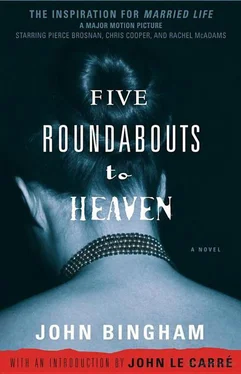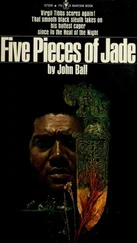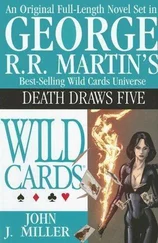John Bingham - Five Roundabouts to Heaven
Здесь есть возможность читать онлайн «John Bingham - Five Roundabouts to Heaven» весь текст электронной книги совершенно бесплатно (целиком полную версию без сокращений). В некоторых случаях можно слушать аудио, скачать через торрент в формате fb2 и присутствует краткое содержание. Жанр: Криминальный детектив, на английском языке. Описание произведения, (предисловие) а так же отзывы посетителей доступны на портале библиотеки ЛибКат.
- Название:Five Roundabouts to Heaven
- Автор:
- Жанр:
- Год:неизвестен
- ISBN:нет данных
- Рейтинг книги:4 / 5. Голосов: 1
-
Избранное:Добавить в избранное
- Отзывы:
-
Ваша оценка:
- 80
- 1
- 2
- 3
- 4
- 5
Five Roundabouts to Heaven: краткое содержание, описание и аннотация
Предлагаем к чтению аннотацию, описание, краткое содержание или предисловие (зависит от того, что написал сам автор книги «Five Roundabouts to Heaven»). Если вы не нашли необходимую информацию о книге — напишите в комментариях, мы постараемся отыскать её.
Five Roundabouts to Heaven — читать онлайн бесплатно полную книгу (весь текст) целиком
Ниже представлен текст книги, разбитый по страницам. Система сохранения места последней прочитанной страницы, позволяет с удобством читать онлайн бесплатно книгу «Five Roundabouts to Heaven», без необходимости каждый раз заново искать на чём Вы остановились. Поставьте закладку, и сможете в любой момент перейти на страницу, на которой закончили чтение.
Интервал:
Закладка:
“All quiet round here, tonight?”
“Not a mouse stirring, sir.”
Bartels took out his cigarette case. “Cigarette?”
The policeman hesitated, then removed a glove, looked briefly round the Broadway, and accepted one.
“Not supposed to, really, sir.”
“You’ll probably find a quiet corner.”
“I wouldn’t say it isn’t done sometimes, sir. Thanks.” He smiled and put the cigarette into his breast pocket. There seemed little more to say.
Reluctantly, Bartels put the car into first gear and released the handbrake. He bade the policeman good night and took the road leading to Kensington. His depression had lifted. He thought: I must get this thing into its right perspective. He would have liked to have had a drink with the policeman. Perhaps several drinks, so that they could reach the stage where personal problems could be aired, and the policeman would forget that he was a policeman and give the common-sense view of a down-to-earth man.
“Well, sir, if you’re not happy with your wife, leave her,” the policeman would say in his solid way. “There’s no need to kill her. That’s murder, sir, and there’s no two ways about it. You get hanged for that sort of thing.”
“But it’s to save her suffering and humiliation,” he would reply. “What difference do a few years more or less make, in all the aeons of time which make up eternity?”
“I don’t know what an aeon of time is, but I know what murder is.”
“It’s a mercy murder; surely you see that?”
He imagined the man taking a gulp of his beer, and setting down his glass and saying: “Murder is murder, sir, call it what you like.” And his own reply:
“But, dammit, she is flesh and blood, and filled with her hopes for the future. I am part of those hopes.”
Now he imagined the constable looking at him in surprise and heard him say:
“Don’t think me rude, sir, but aren’t you being a bit conceited? There are other men in the world, sir. She sounds a very attractive young lady. Anyway, there’s no reason to kill her, sir, none at all. That’s murder, that is.”
“You think she would get on all right without me?”
“I think she would be very hurt, sir. Especially in her vanity. Women are great ones for vanity, sir.”
“But she would get on all right in the end?” he heard himself insisting.
“I’ve no doubt she would get over it, sir. Anyway, she would rather take her chance, sir, if you were to be so bold as to put it to her.”
By the time he had reached the traffic lights at Holland Road he had made up his mind. He saw now that he had been overdramatizing things. He had been neurotic and hypersensitive and ridiculous, and had very nearly put his neck, literally, into a noose.
It was perfectly simple, after all.
He would leave Beatrice and go and live in digs again, near Lorna. He would do just that. He would give Beatrice a handsome share of his income. Five hundred a year, that’s what he would give her. Tax-free, too. A good income that, even in these days.
She would be all right on that. If he earned more money, he would give her a share of that, too. He’d be generous all right. She never would be able to reproach him on that score. Then she would divorce him, and he would be able to start afresh with Lorna. Just the two of them, together, for always.
Beatrice was a strong character really; she just had moments of weakness; but Lorna needed him and he needed Lorna. Beatrice would be hurt, which was a pity, but she wouldn’t live in a wilderness of loneliness as Lorna would without him. Lorna wasn’t as strong as Beatrice.
Beatrice would go out into the world again and, with her indomitable courage, carve out a new life for herself, probably a far better life than she had led with him. He felt queasy as he thought how, through a total misjudgement of the situation, he had so nearly placed himself within reach of the law. After all, however clever you were, there was always a chance that you would be caught.
“There’s always the risk,” he murmured, “there’s always the risk.”
By the time he had driven up to the door of his block of flats, he knew that what he had decided to do must be done quickly. He knew himself, at least to some extent.
In two days he was going up north again. In Manchester he would write Beatrice a letter explaining things. He would praise her to the skies, and the praise would not be unmerited. He would take all the blame upon himself, blacken himself, castigate his own weakness.
There would be no criticisms, no reference to previous quarrels, no harking back to grievances and past disappointments, no suggestion at all that since she had married with her head rather than her heart she was at least partly to blame.
Then he would simply not come back.
Knowing himself, he knew that he might weaken if he came back, and if she cried and implored him to give the marriage another chance. He wouldn’t risk it.
As it was late, he left the car in front of the house and went upstairs to the flat. He let himself in quietly, and switched on the light in the hall, and glanced casually at the letters on the hall table.
There was a Final Demand from the gas company, a document from the authorities telling him that unless he appealed he would be summoned for jury duty, and a bill from the local garage: a fairly representative selection of letters, in fact. He stuffed them in his overcoat pocket. Before he left, he would clear up all outstanding bills; he would leave her clear, able to make a clean start.
He made his way to the kitchen and cut himself a thick slice of bread and cheese, and ate margarine with the bread to economize the butter ration. Beatrice did not like margarine.
There was three-quarters of a pint of milk in the refrigerator. He poured himself out a cup, then realized that there would not be enough left for coffee for breakfast. Beatrice preferred coffee to tea. He poured the milk back into the bottle, and replaced it in the refrigerator, and quenched his thirst with water.
It made him feel like a man apologizing for stepping upon the toe of an individual into whose back he was shortly to plunge a stiletto.
Bartels went into the drawing room, and stood by the embers of the fire which Beatrice had made up for him. He looked around the room, noting objects which linked him to the past.
There was the picture of the Seine which he and Beatrice had bought in Paris while on their honeymoon, upon which, indeed, they had spent more money than they could afford. There was the set of porcelain horses Beatrice had bought while visiting a friend in Belgium. And the Victorian silver picture frame, holding a picture of Beatrice as a girl: the first thing they ever bought for their home.
He looked at these things, trying to resurrect from the ashes of his emotions some tiny flicker of sentiment. But there was nothing left; it was all dead, grey, unstirring, and without warmth. He saw only a painting, some china objects, and a frame with a good-looking girl in it.
He threw the remains of his cigarette into the grate and began to undress in the drawing room, as he always did when he was late, in order not to disturb Beatrice. He went into the bedroom in his shirt and underpants, and quietly slipped them off and put on his pyjamas.
Beatrice had left the gas-fire burning, half turned up, and he turned it up higher and stood by it, warming his hands and feet.
By the light of the fire, he could make out the two twin beds, side by side. Beatrice was asleep, lying on her back, one arm above her head, as though she had found the room and the bedclothes too hot. As his eyes grew accustomed to the dim light, he saw something white on the small table by his bedside, and moved silently across to see what it was.
Читать дальшеИнтервал:
Закладка:
Похожие книги на «Five Roundabouts to Heaven»
Представляем Вашему вниманию похожие книги на «Five Roundabouts to Heaven» списком для выбора. Мы отобрали схожую по названию и смыслу литературу в надежде предоставить читателям больше вариантов отыскать новые, интересные, ещё непрочитанные произведения.
Обсуждение, отзывы о книге «Five Roundabouts to Heaven» и просто собственные мнения читателей. Оставьте ваши комментарии, напишите, что Вы думаете о произведении, его смысле или главных героях. Укажите что конкретно понравилось, а что нет, и почему Вы так считаете.












